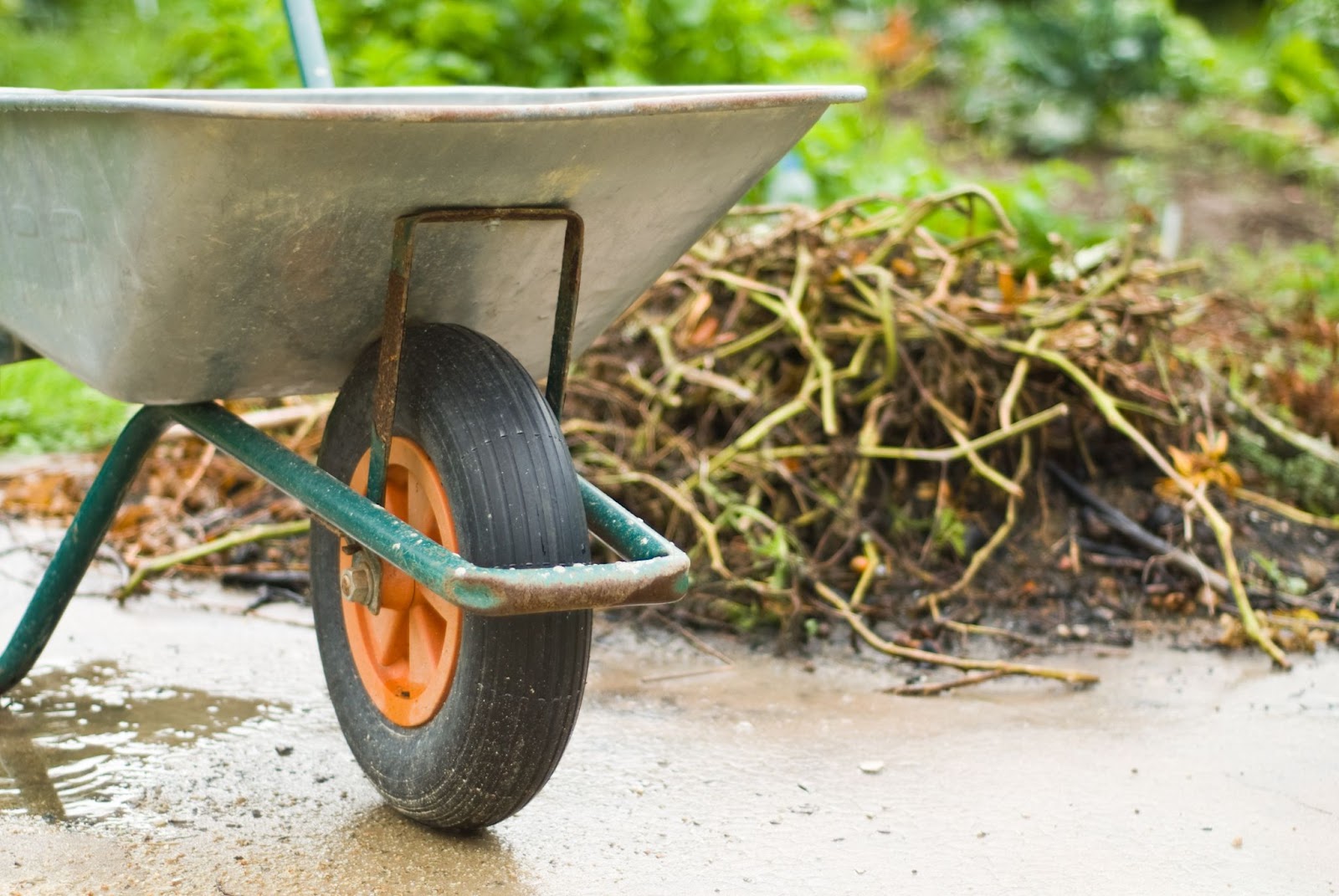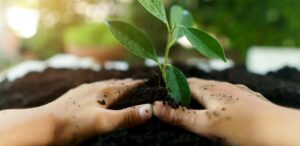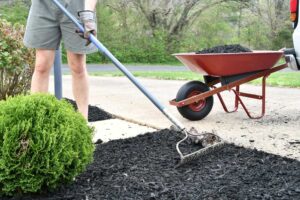If you have a yard to maintain, you’ll need to know a thing or two about yard waste removal. It isn’t as easy as throwing yard debris into the trash. To help you sort through your options, Texas Disposal Systems has compiled our top recommendations for disposing of yard waste the smart and easy way.
What is yard waste?
There are two types of yard waste: green waste like leaves and grass and brush like twigs and branches. Yard waste does not include inorganic materials like glass, plastic, or metal.
Most outdoor projects—gardening, lawn care, landscaping—create some kind of yard waste. Large projects, like tree removal or tree trimming, can create enormous piles of organic debris.
And if you’re working on an outdoor project that creates both organic yard waste and inorganic waste, you’ll want to dispose of that waste separately from your other trash.
Why can’t you put yard waste in the trash?
In many communities, dumping yard waste in your trash bin is not prohibited as it takes up a large amount of space and has the potential to become a safety hazard. Though this may seem restrictive, improperly disposed yard waste contributes to land pollution, a serious issue that affects the health of our soil, water, air and more. The laws around the proper removal of yard waste exist to protect both local ecosystems and our environment as a whole.
Specifically, dumping yard waste improperly endangers the environment by:
- Wasting natural resources: When yard waste is thrown in the trash, it takes up space in local landfills. Because yard waste is biodegradable, it should be processed separately so it can be transformed into products such as compost or mulch that nourish the soil.
- Creating trash fires: If any wood or brush has been burned and then put into the trash cart, it increases the chances of those items in the cart catching fire and turning that load into what is called a “trash fire.” Things like ashes that are still hot can cause an entire trash load to go up in flames. “Dumpster fires” aren’t just funny memes.
- Allowing invasive plant species to spread. Native plants are integral parts of the web of life that has existed in your area for thousands of years. Invasive plants can decimate native plant populations and even endanger animals higher up the food chain.
How do I get rid of yard waste?
There are many options for yard waste removal, but there are pros and cons that come with each. Some are appropriate for regular lawn maintenance, while others make more sense when you are completing a large-scale outdoor project like landscaping after a storm.
Yard waste removal options
1. Rent a roll-off dumpster
Renting a dumpster allows you to clear your property of yard waste on your own schedule, but it’s important to do your research before you begin filling your dumpster.
- Depending on your waste disposal service, you may or may not need to bag your yard waste.
- Some companies will not take specific materials, like treated wood, or especially large items, like tree stumps. Please review your local guidelines for complete details on disposing of certain items.
- Most disposal services offer multiple roll-off dumpster sizes. You’ll need to decide what size is ideal for your project. For Central Texas residents, our dumpster rental guide can help you make the right choice!
2. Use your local waste hauler service
Some local municipal waste collection services will pick up yard waste a few days per year, or even on demand. If you can schedule your yard work around your collection service’s calendar or schedule a pickup, this can be a convenient option for yard waste removal.
However, this service isn’t available everywhere, and most services will only pick up a small amount of yard waste from your home. Additionally, this type of yard waste pick-up often requires that residents and businesses bag their waste in a particular way before removal.
3. Subscribe to a local yard waste pickup service
Some communities, especially those where the local collection service does not offer yard waste pickup options, have residential curbside solutions and business solutions for organic waste. Texas Disposal Systems offers collection service for yard waste in most residential areas. This organic waste is then composted through TDS’s compost division and turned into Garden-Ville products which are rich in the essential nutrients your yard and plants crave.
DIY yard waste disposal options
If you are the DIY type who works hard to be an environmental steward in your community (and even if you aren’t!) there are lots of options for re-using your yard waste.
1. Create mulch with a wood chipper
Most hardware stores will rent out wood chippers that allow you to turn your yard waste into mulch. Most wood chippers can’t handle huge branches, so you’ll need to cut large pieces of woody waste down to size. Wood chipping can be time-consuming, but for avid gardeners, the mulch is well worth it.
Need a little extra guidance? Here are some more brush removal tips to help you whip your yard into shape!
2. Create a DIY compost bin
A compost bin can provide you with fertilizer that will improve your soil quality and nourish your plants. Better yet, starting one can be inexpensive or free if you use upcycled materials to build it! If you’re new to composting, you’ll first want to learn what goes into compost—and what doesn’t.
Food waste and yard waste are great additions, but neither weeds nor plants should be composted, since plant seeds and diseases can survive the composting process. A low- maintenance compost heap you aerate just once every few months will break yard waste down within about a year. For more advice, check out TDS’s composting tips.
3. Leave grass clippings and leaves on the lawn
Large pieces of yard waste can be either a hazard or an eyesore, but small bits of grass and fallen leaves are different. When left to decompose, they can protect and nourish the soil in your yard. If the sight of grass clippings is bothersome to you, try mowing over them twice to further break them down.
4. Recycle brush and branches in your raised garden beds
If you have a raised garden that needs filling, you can start with a layer of yard waste and then add soil and compost to cover it. This strategy not only allows you to recycle yard waste, but it also saves you money by reducing the amount of soil and fertilizer you’ll need to add to your garden beds.
5. Bring it to a yard waste collection site or composting center
If you have access to a large vehicle and don’t feel like scheduling a pickup you can bring your yard waste to a local yard waste disposal site. Composting centers cannot be found in every community, but they are becoming more and more common.
For example, Texas Disposal Systems processes household and business yard waste into Garden-Ville compost, mulch, and fertilizer, which can be found in gardens all over Central Texas!
Before you head to the collection site, always check its website to determine what can be recycled, whether you’ll need to transport your yard waste in paper bags, and whether there is a fee for drop-off.
Can I burn my yard waste? (And even if I can, should I?)
Burning yard waste used to be a standard practice in communities all over the United States. But that was in the olden days. We now know that burning yard waste can release harmful substances like carbon monoxide, dioxins, nitrogen oxide, and particulate matter into the air. It also increases the risk of wildfire. For these reasons, it’s best to avoid this yard waste removal method.
However, if you don’t have access to any of the waste disposal options above, we recognize that burning may be your only viable solution. If you do choose to burn your yard waste, be careful to do it safely!
- Check with your local Fire Department to learn if your area is permitted and/or if you are under a burn ban. Here is a link to Texas’ burn bans.
- Choose a windless day to burn. High winds can quickly make your fire get out of control!
- Start the fire in a contained fire pit or barrel that is at least 150 feet from your neighbors’ homes and 50 feet from your own home.
- Keep a hose or fire extinguisher at the ready at all times.
It’s also crucial to check local outdoor burning regulations before lighting the match. Some areas restrict or prohibit outdoor burning without a permit, while others allow it only at certain times and in certain locations.
Yard waste removal safety tips
Whether you are filling a dumpster, hauling bags of yard waste to a collection site, or composting your yard waste at home, it is important to handle yard waste safely.
- Cover your hands, feet, arms and legs. To prevent cuts, splinters and rashes, wear gloves, closed-toe shoes, long sleeves and pants when you are handling yard waste.
- Use rakes and shovels to collect yard waste. Resist the urge to grab branches, leaves and twigs with your hands! Let the appropriate tools do the job for you.
- Lift with your knees. When you are picking up large or unwieldy pieces of yard waste, be sure to lift with the proper technique. If you are prone to back pain, consider using a back brace for increased support. Be careful!
- Load big items before smaller items. To ensure an evenly loaded dumpster or truck bed, start by loading the biggest pieces of yard waste you have. Then use smaller pieces of waste to fill in the spaces between bulkier items.
- Don’t overload dumpsters or truck beds. It’s better to rent another dumpster or take another trip to a collection site than to risk polluting the environment or causing an accident with flying debris!
Yard waste removal cost
The cost of yard waste disposal can vary significantly depending on the method you use, the amount of waste you have, and your location. If you’re in Central Texas, contact Texas Disposal Systems for a quote on any of our yard waste removal services.
Remove yard waste the smart way with Texas Disposal Systems
We hope this guide has provided you with some helpful hints on yard waste removal. TDS prides itself on providing our community with options to divert yard waste from landfills and reduce their carbon footprint.
Whether you need a roll-off dumpster, information about our landfill and transfer stations, or a list of our curbside green waste solutions in Central Texas, Texas Disposal Systems is here to help. We offer a wide variety of yard waste disposal solutions for homeowners, as well as landscape solutions and compost processing for business owners.
For more information on all of our services, contact us online or give our Customer Care team a call at (800) 375-8375. We look forward to helping you create the yard of your dreams!





